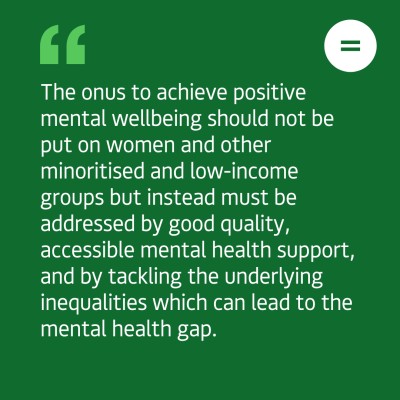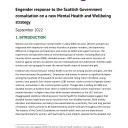Engender blog
The mental health gap for women in Scotland

Women’s social, economic, cultural and political inequality with men undermines good mental health and wellbeing in a wide range of ways, including the impacts of gender stereotyping, medical misogyny and racism, and of course the disproportionate impact that austerity, Covid-19 and the cost of living crises have on women's mental health.
Recently Engender was invited to speak to civil servants working in the Scottish Government's Mental Health Strategy and Co-ordination unit, about the ways in which women's ineqaulity and mental health intersect. Here are some of the things we spoke about.
Women and men experience mental health in vastly different ways. Women and girls are diagnosed with depression and anxiety disorders in greater numbers than men, and experience difference in diagnosis and treatment, and access to health and support services. The experiences and specialist needs of minoritised groups of women, including Black and minority ethnic women (BME), disabled women, LGBT women and victim-survivors of violence against women are distinct, but are underexplored and understood. Currently, Scottish public services are simply not equipped to meet the mental health needs of women and girls.
The Covid-19 crisis and now the cost of living crisis will have a deepening impact on the gendered nature of Scotland’s mental health crisis. The impacts of the Covid-19 pandemic on mental health were and are experienced disproportionately by women, with particularly acute impacts experienced by disabled and young women (read our joint briefing with Close the Gap on Covid and mental health here). Women are already feeling impacts of the cost of living crisis that will affect their mental health and wellbeing, as the majority of low-paid and precarious workers, as unpaid carers and lone parents with low incomes and high energy needs, as women financially unable to leave abusive partners, and as ‘poverty managers’ responsible for stretched household budgets and spending on children.
We're also seeing a growing mental health crisis for young women and girls - a large-scale study from Steer Education, published in February 2022, found that the mental health of girls (aged 11-18) is “at a precipice” with the pandemic leading to a “growing gulf” between girls and boys. Particular mental health challenges can also exist for women during pregnancy - with an estimated one in four women experiencing mental health issues, with depression and anxiety the most commonly reported disorders. And of course the trauma experienced by so many women - whether due to men's violence against women, state violence during migration, or through racism, ablism, transphobia or other forms of bigotry - can have a lasting impact on mental wellbeing.
Despite this, the current Scottish Government strategy on mental health is virtually gender-blind (it only references women four times - once in a footnote regarding CEDAW, twice in reference to the action on perinatal mental health, and once in a quote describing the gender breakdown of the onset of psychosis) and demonstrates no understanding that inequality and violence contribute to poor mental wellbeing by constraining opportunities, restricting financial resources, diminishing the importance of women’s social roles and leaving them responsible for unpaid care. Nor does it identify women’s highly gendered experiences of mental health and wellbeing or address women’s needs.
Luckily, the Scottish Govenment is consulting on a revised mental health strategy, and Engender has submitted a comprehensive response to it here.
We must recognise the structural, and highly gendered, nature of mental health. The onus to achieve positive mental wellbeing should not be put on women and other minoritised and low-income groups but instead must be addressed by good quality, accessible mental health support, and by tackling the underlying inequalities which can lead to the mental health gap. It is impossible to talk about improved mental health for women without also addressing issues around unpaid work, caring responsibilities, inequality of income, sexism in healthcare and employment, and all the other ways in which women’s inequality persists in Scotland.
That being said, there is still an urgent need for investment in well-gendered services; we cannot simply throw up our hands and accept that while women's inequality exists, women's poor mental health is an inevitability. We need mainstream mental health services to take into account the different needs and experiences of women, but we also need more, better-funded specialist services which support different groups of women, and with expertise in different forms of trauma.
Our response also highlights a number of other issues which must be taken into account to ensure that Scotland’s response to the growing mental health crisis doesn’t further entrench women’s inequality, including good data (of course!), and challenging the structural sexism which exists across medical and healthcare institutions.
You can read our full response to the consultation on a review of the Scottish Government mental health strategy here.
Share this post on …
Comments: 0 (Add)
Downloads
 Engender response to the Scottish Government consultation on a new Mental Health and Wellbeing strategy
Women and men experience mental health in vastly different ways.
Engender response to the Scottish Government consultation on a new Mental Health and Wellbeing strategy
Women and men experience mental health in vastly different ways.
 Seventh periodic report of the government of the United Kingdom on measures taken to give effect to ICESCR - Engender Shadow Report
This is Engender's shadow report to the 7th periodic report of the UK Government to the UN's Committee on Economic, Social and Cultural Rights.
Seventh periodic report of the government of the United Kingdom on measures taken to give effect to ICESCR - Engender Shadow Report
This is Engender's shadow report to the 7th periodic report of the UK Government to the UN's Committee on Economic, Social and Cultural Rights.

Newsletter
Sign up to receive our newsletter here:
Sign up to our mailing list
Receive key feminist updates direct to your inbox: